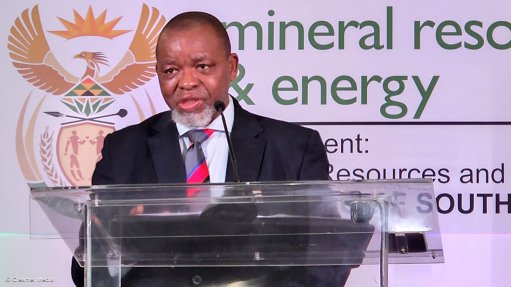
Mineral Resources and Energy Minister Gwede Mantashe
Minerals Resources and Energy Minister Gwede Mantashe reported on Thursday that the Integrated Resource Plan of 2019 (IRP 2019), which is widely acknowledged to be out of date, will be reviewed.
However, he said he could not yet provide a timeframe for the publication of the update or indicate what process would be followed.
Speaking at a ceremony held to sign power purchase and implementation agreements for three solar-battery hybrid projects to be developed at a cost of R16-billion by Scatec and H1 Holdings in the Northern Cape, Mantashe indicated that the decision to update the document had been taken at a recent Cabinet retreat.
He reported that President Cyril Ramaphosa requested his Ministers to identify “burning platforms” within their portfolios and that he had identified ongoing load-shedding as the key problem facing his portfolio and that of the economy.
“The last three days, we have been locked away in the bush and the President asked us a simple question: what are the burning platforms in your areas of work?
“In my area of work, the burning platform that we identified was load-shedding.”
He said the decision to review the IRP 2019 had been made too recently to provide specifics on either the timing or process to be followed but indicated that it would involve an intensive reassessment of the plan’s assumptions and likely involve public consultation.
In the meantime, he said efforts would be made to accelerate the implementation of the IRP 2019 through a streamlining of procurement processes for the more than 13 000 MW already catered for in the IRP 2019.
Besides seeking to conclude agreements for the eight remaining projects under the controversial Risk Mitigation Independent Power Producer Procurement Programme (RMIPPPP), following the signing of the first three project agreements, Mantashe was keen for Bid Window Five (BW5) of the renewables programme to close in line with the new staggered deadline and for BW6 to avoid any delay.
In addition, he indicated that BW7 could be upscaled from the initial determination, which catered for the procurement of only 1 600 MW of onshore wind.
Mantashe also said a gas-to-power bidding programme would be opened along with one for new coal, although he anticipated that the coal programme could face a legal challenge.
The Minister lamented the time it was taking to complete the procurement of much-needed new electricity capacity and said a formula had to be found to cut the time it was taking for processes to be completed and “make it easier to do business in South Africa”.
He also said that Eskom needed to do more to expand the grid and expressed the hope the unbundling of the transmission entity would open up the market as a “wheeler and dealer” in energy.
Eskom CEO André de Ruyter responded by acknowledging the grid constraint, but also highlighted the opportunity that existed to build new generation in Mpumalanga where capacity already existed and where even more would become available as coal plants were decommissioned.
IPP Office CEO Bernard Magoro said that many lessons had been learned from the RMIPPPP, which was the first procurement process to be implemented after the stalling of procurement in 2015 when Eskom’s then leadership refused to enter into power purchase agreements with new renewables producers.
He also said that it was working with Infrastructure South Africa and Operation Vulindlela to streamline the associated processes – including the securing of environmental authorisations and licences – that needed to be followed when procuring new generation capacity.
“As government, we can do a lot to refine our processes,” Magoro said, arguing, for instance, that environmental authorisation appeals should not be taking as long to resolve as they were currently.
A consultant had also been appointed to analyse the local market capacity for solar module manufacturing, in light of the concerns raised by bidders after modules were designated to be procured locally.
“Those are the kind of changes that are going to help us in accelerating future procurement.”
Internally, too, the IPP Office was seeking to find ways to reduce the timelines between the announcement of preferred bidders and financial close.
Under BW5, it had been hoped that the timeframe could be reduced from a year to six months, but that target was not achieved.
“But, in future, surely it cannot take a year to close a project.”